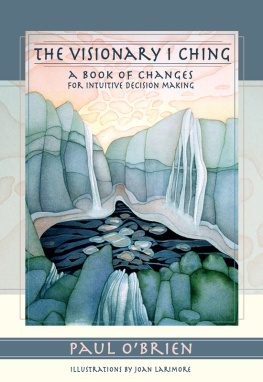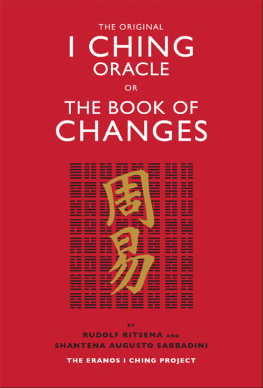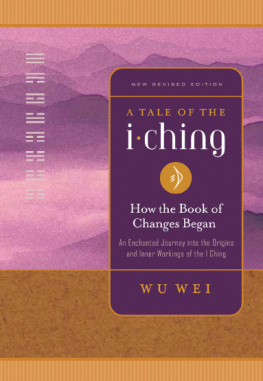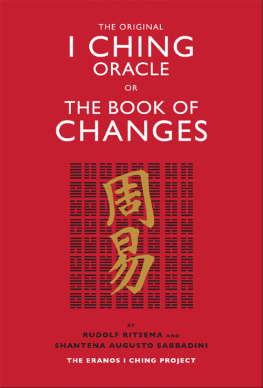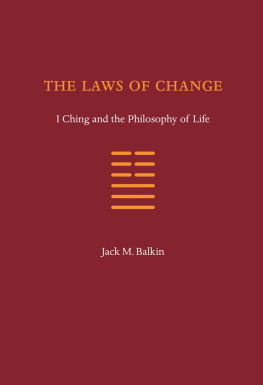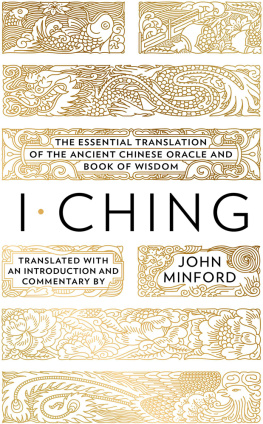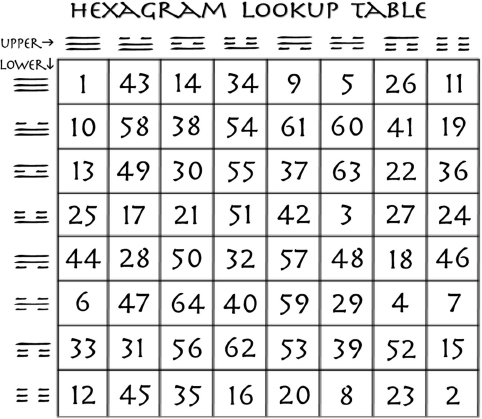Copyright 2013 Paul OBrien. All Rights Reserved.
No part of this book may be reproduced, stored in a retrieval system, or transmitted by any means without written permission of the author.
Divination Foundation Press,
(New Revised Edition June 2018)
www.Divination.com
ISBN-13: 978-0-9884942-5-1
HOW TO USE THIS BOOK: If you are familiar with the I Ching, cast the coins or sticks to construct your hexagram in the way you are accustomed, then use the Hexagram Lookup Table in the Table of Contents to find your hexagram and all its changing lines. For new I Ching users, go to the chapters in that give instructions for casting a reading, some history of the I Ching, and a humble explanation of how the I Ching works. Enjoy!
TABLE OF CONTENTS
Authors Preface How The Visionary I Ching Came To Be
We live in a time of accelerating change, a period when things are changing so rapidly that it feels chaotic. While change may indeed be more furious due to technological and cultural transformations, life is always in a state of flux. In fact, change has always been the only constant, the one thing that we can absolutely count on.
The key to success and relative happiness in a time of accelerating change is the art of change management. The central skill of adaptation -- making timely adjustments and taking advantage of change -- is better decision-making. Indeed, making good decisions is the executive skill in the life of everyone, whether it be on a personal, social or organizational level.
Fortunately, ancient Taoist sages long ago left us a powerful and profound change management tool in the form of their great classic: the I Ching, or Book of Changes. Perhaps the oldest book in the world, the I Ching is much more than a book; it is a psychologically sophisticated system that stimulates intuition in order to view how things evolve, to interpret changing conditions from a broader point of view, to help with timing and other visionary decisions going forward. The more I personally have used the I Ching for insights or advice during the past four decades, the stronger my feelings of reverence and gratitude for it have grown. The I Ching has helped me with almost every major decision in my adult life since the day I was introduced to this oracle-book as an undergraduate at the University of California in Berkeley.
In that carefree period of my life as a college student, the problems I was most concerned with involved the fascinating but confusing terrain of relationships. Despite a predilection for philosophy and a record as a top student, as a teenager my testosterone-fueled attraction to girls was stronger than my academic and spiritual interests. So, when a charming University of California co-ed offered to show me how to cast a reading -- using an ancient Chinese book that would give back wise counsel -- she already had my attention. Skeptical of her oracle, but happy to spend some time with her, I played along.
She instructed me to write down a topic of concern or name of someone I was having dealings with. Without taking the process seriously at all, I scribbled down something. Then she had me toss three Chinese copper coins six times, and showed me how to construct a hexagram from the way the coins had landed. She looked up the response in her large book which, as it turns out, was the popular Wilhelm-Baynes translation of the I Ching. I was more interested in her, but I was curious to see what the oracle would come up with.
In that very first reading of my life, the I Ching ignored my query and instead reflected my smart-aleck energy with Hexagram #4, titled Youthful Folly, which describes an immature student who lacks respect for the teacher. This gave me pause. Almost chastised, I asked my new friend if I could try it again. My question was just as trivial, but this time I was testing the I Ching, just to see what would happen. Once again it ignored my meaningless query and replied questioning the sincerity of the seeker. Whoait was testing me right back!
In hindsight, I see that the I Ching was offering me a chance to learn what it is about. In the 40 years since I accepted that invitation, I have benefitted enormously from its help. In return, I have composed this modern, useable version of the I Ching to make it easier for others to share in the same benefits.
There have been several pivotal times in my life when Ive used the I Ching to help me make what turned out to be life-changing decisions. On occasion, it helped me to renew a sense of direction, strengthen my sense of purpose or overcome a fit of self-doubt. Sometimes the time is right to steer ourselves onto a more inspiring and more authentic pathway, but we have trouble seeing, considering and grasping the opportunity. On a few rare occasions, I Ching readings prompted me to make a huge and risky decision -- such as my decision to leave a well-paid executive position to publish a multimedia version of the I Ching in 1989 -- which was a wild and crazy idea, even though it was based on long-held personal fascinations of mine. Whether I used a book version or, later, the I Ching software that I produced, I turned to the Book of Changes for guidance and a refreshed sense of direction, and continue to do so. At the same time, out of respect, Im careful to neither misuse nor overuse it. My policy is to turn to the I Ching when I have a dilemma that logic cant handle. No worries on that frontlife provides an abundance of those -- in the areas of relationships, timing, negotiations, politics and many more!
In the early years of my personal I Ching use, I used the Wilhelm-Baynes version that my pretty friend had introduced to me, which has always been the best-selling translation and widely considered the most authoritative (to some extent because of Carl Jungs forward to the book). As my desire to study the I Ching in depth grew, I acquired dozens of different versions. For many years I used, read and compared the text of several whenever I would consult the I Ching. I always included it in the set I would refer to, but over time I became increasingly aware of the Wilhelm versions limitations. My forays into Chinese history supported the idea that the version Wilhelm translated, from the Chinese texts that he had access to, reflected some of the political biases of 19th century China (perhaps to shed favorable light on the rulers of the Qing Dynasty, who were in power during the 19th century when he was translating with the help of a loyal Chinese subject). Working from ancient writings, the Wilhelm text -- required by social conditions at the time to reflect the cultural limitations of dynasties, Confucianism, etc. -- was marked by the Chinese versions of a patriarchal and militaristic slant. In addition, the English translation of Wilhelms German translation by Baynes carried over a slightly stiff Germanic and academic flavor.
Some 2600 years ago Confucius spent a good portion of his life studying and writing about the I Ching. His commentaries, which have hugely influenced the text, reflected his social philosophy, with an emphasis on doing ones duty and knowing ones place in a rigidly defined hierarchical society. Of course, I could use the classical translations and make allowances for antiquated cultural aspects, and this is what I myself -- and most of the other I Ching users I knew -- did for years. At the same time, even though I respected the time-honored traditional aspect of the I Ching greatly, I imagined how the language and imagery could better speak to modern users (especially including women). I could not relate to the sexism of the superior man or the meaning of common phrases like the army marches to the southwest. Having used the I Ching for over twenty years at the time, I had come to hope for a modern version that would be more accessible to, and satisfying for, psychologically sophisticated modern users like myself.

